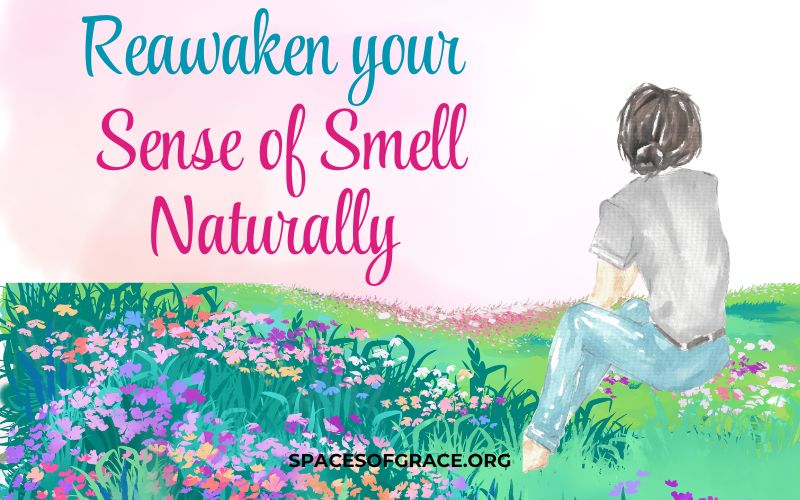I ducked into a beautiful flower shop, anxious to explore. Every nook and cranny was filled with gorgeous blooms. Eagerly, I stuck my nose in a tempting display of roses and inhaled.
Nothing. Not even a whiff of a scent.
The shopkeeper told my disappointed self that today’s roses are often bred for their longevity, which renders them scentless. How sad is that!
Overly Scented
On the other hand, products are often highly scented wth artificial fragrance. If you’ve ever walked by a body care or candle shop as the door swings open, you know exactly what I mean. It’s overpowering. Rarely do plants in nature smell like that.
What Does God Think About Scent?
Fragrance was an important part of life for ancient Israel. In the Bible, fragrance was first introduced as a means of worship.
“Aaron shall burn incense of sweet spices on it every morning. When he tends the lamps, he shall burn it. When Aaron lights the lamps at evening, he shall burn it, a perpetual incense before the LORD throughout your generations.” Exodus 30:7-8 WEBP
“The smoke of the incense, with the prayers of the saints, went up before God out of the angel’s hand.” Revelation 8:4 WEBP
Worship and More
In addition to worship, fragrance in Biblical times was also used for personal adornment, in burial practices, as a symbol of wealth and status, and in spiritual symbolism. Perfume was made by skilled artisans, called perfumers or apothecaries.
10 Ways to Reawaken Natural Scent in Your Life
Today, let’s see how to naturally reawaken our sense of smell by exploring a few simple things to do in our homes or gardens. As I’ve found, natural scents can be uplifting and healing.
- Grow a fresh potted herb. I love herbs. I’ve grown them for years, both outdoors and indoors. I have so many favorites, it’s hard to choose, but I’ve included a few here. Please note, these are affiliate links to Amazon, but you can easily buy many plants locally.
- Lavender (Lavandula angustifolia). This popular herb has highly scented leaves and flowers. Choose one of the culinary lavenders and you can use it for cooking/baking as well as potpourris and cosmetic use. The English lavender and its cultivars are all edible. These include Hidcote, Munstead, Royal Velvet, Folgate, and Melissa. If you put the pot in a prominent spot in your home or outdoors in your garden, brush the leaves as you walk past to release its amazing fragrance.
- Scented geraniums (Pelargonium graveolens). Oh my. I am obsessed with these plants. Different from the red and pink geraniums typically grown in gardens, scented geraniums have large aromatic leaves in a multitude of fragrances. Use in potpourris, teas, and baking. If you grow it indoors, you may have to keep it trimmed, as some grow quite wide/tall. A few of my favorites are Rober’s Lemon Rose, Attar of Rose, Ginger, and Angel’s Perfume.
- Lemon Balm (Melissa officinalis). This happy herb is perfect for growing in a pot as it’s a member of the mint family and will spread throughout your garden if you don’t contain it. Lemon balm makes a divine tea with its gorgeous lemon scent and flavor.
- Rosemary (Rosmarinus officinalis). Rosemary is a wonderful herb to have on hand for its pungent scent and use in cooking. It has an affinity for the respiratory system.
- Thyme (Thymus vulgaris). Known for its culinary use, thyme is also a powerful medicinal herb. I use it extensively for respiratory illnesses/coughing by making a thyme steam.
- In the non-growing season, purchase some fragrant flowers. Ask your local florist about what scented flowers they might have in stock. Certain roses like David Austin, are highly scented. Your florist probably also carries carnations, some of which have a clove-like fragrance.
- Cut fresh lemon wedges and squeeze one or two into a glass of water to drink. I do this every morning right after I get up to rehydrate myself.
- Go to a health food store or other grocery that sells bulk spices. Try a new-to-you spice you may not have used before. Some suggestions: curry, ginger root, turmeric root, and cardamom. Become familiar with its scent and research a recipe to try.
- Take a walk in the woods, breathing deeply. Walk through a stand of pine trees. Forest bathing calms the soul and spirit.
- Go outside after a rainstorm. Did you know that the smell of rain has a name? It’s called petrichor.
- Make your own natural potpourri by simmering water, orange peels, and a cinnamon stick on your stovetop or in a small crockpot. This is especially nice over Thanksgiving and Christmas.
- Switch your toxic cleaners to the Seventh Generation Disinfecting Multi-Surface Cleaner products. They use thymol to disinfect.
- Choose a natural beeswax perfume made with essential oils.
- Light beeswax candles and skip the toxic, artificially scented candles.
The Blessing of Scent
I’m so thankful God created scent in our world. However, I know many people who struggle with an impaired sense of smell. If COVID or another illness has affected your sense of smell, you may be able to improve or regain your sense of smell with smell training. Mary was able to regain much of her sense of smell after losing it in 2021.
Please leave a comment and let us know how you reawaken natural aromas in your life.





0 Comments